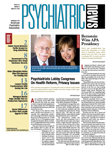The difference in outpatient psychiatric office visit duration for white people and African Americans—a proxy for quality of care—appears to have narrowed dramatically in recent years.
The average duration of outpatient visits by African Americans between 2001 and 2006—adjusted to account for potentially confounding patient, psychiatrist, and practice characteristics—was 3.5 minutes shorter than visits by white people, according to a report in the February Archives of General Psychiatry.
But that disparity is largely due to the substantial gap of 7.4 minutes that existed in the early years of the period, 2001 to 2004. Between 2004 and 2006 the gap virtually disappeared, dropping to 0.1 minute.
The analysis controlled for difference in duration of visits for psychotherapy and medication management, so that the racial difference in visit duration during the five-year period—as well as its significant narrowing in the last three years of the study period—was not mediated by psychotherapy, use of medication, or changes in these variables on the part of either racial group.
“Office visit duration can be thought of as a proxy for clinical attention and therefore serves as a measure of quality of care,” said study author Marc Olfson, M.D., a professor of clinical psychiatry at Columbia University College of Physicians and Surgeons and the New York State Psychiatric Institute. “It's heartening, because it seems the differences between the races [with regard to this variable] have all but disappeared in recent years. And that change is not attributable to changes in rates of psychotherapy or medication management.”
Nor can the closing of the gap in visit duration be explained by an overall decrease in visit length from the 2001-2003 period to the 2003-2006 period. In the first three years, the average adjusted length of an office visit for white people was 32.9 minutes; in the latter half of the study period, that figure dropped only slightly to 32.5 minutes.
But the average length of visits for African Americans rose from 25.5 minutes in the first three years to 32.4 minutes in the later half of the study period.
“We are left with a puzzle,” said Olfson. “I can only speculate that perhaps there really have been recent changes in public attitudes with people, including psychiatrists, becoming more comfortable talking across racial groups about mental health problems.”
He noted that the study analyzes a period when racial disparities in access to and quality of care became a subject of national focus. “It's also true that there has been a lot of attention devoted to this general topic and a greater public awareness of threats to the quality of health care posed by racial disparities,” he said. “The narrowing of the racial gap in visit duration in recent years is a welcome development, but it's not one that we can confidently assign to any one particular cause.”
Data for the study were drawn from the 2001-2006 National Ambulatory Medical Care Survey, a probability sample survey of office-based physicians in the United States conducted by the Centers for Disease Control and Prevention's National Center for Health Statistics.
Physicians were instructed to fill out a patient record form for each sampled visit. The number of forms completed each year by respondent psychiatrists ranged from a low of 1,469 in 2003 to a high of 1,896 in 2004. A total of 7,094 office visits were made by white patients, and 504 visits were made by African-American patients.
The unadjusted mean duration of psychiatric outpatient visits by African-American patients over the entire study period was 4.4 minutes shorter than that of white patients and 3.5 minutes shorter after controlling for potential confounding variables.
Interestingly, a significant race-related difference in visit duration was evident among visits financed by Medicare but not other sources of payment. Olfson noted that African Americans are much less likely to have private supplemental insurance to cover charges above Medicare-approved amounts.
“It may be that additional reimbursement from supplemental insurance contributes to longer visits,” he told Psychiatric News.“ It's one area where there are persisting differences.”
